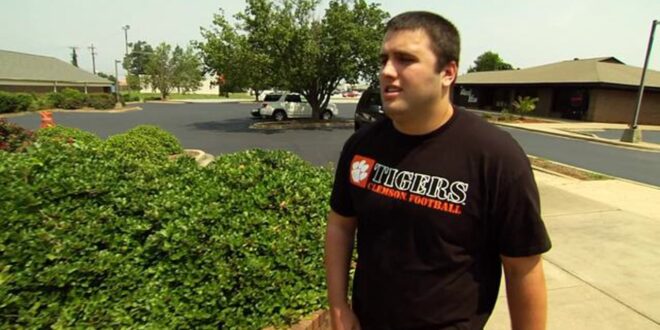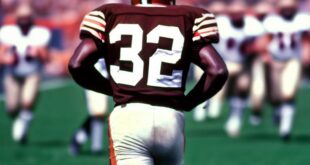High school star suffers stroke, but Clemson honors commitment
National Signing Day came and went the first of this month, and once more college football recruits were inspected and graded like eggs before crating.
Yet despite the thoroughness of the process and the saturation of the coverage, little notice was paid to one of the more remarkable transactions.
Just managing to take a pen in hand and methodically, neatly put his name to paper was Jake Nicolopulos’s victory. Two months after suffering a near-fatal stroke, Nicolopulos signed with Clemson, where he never will play a down. That same day, he moved from Atlanta’s Shepherd Center to its Pathways rehab facility, where he remains today, learning again to walk and talk.
Three days after signing in sterile confines far from home, Nicolopulos was visited by close to 70 friends, coaches and family from his hometown of Anderson, S.C. They came to Atlanta and the center specializing in traumatic brain injuries to hold a delayed celebration. It was a gathering unlike any other played out that week, one of purely personal significance, with no impact whatsoever on the course of college football.
“We wanted him to have his signing day,” said Kenya Fouch, his coach at T.L. Hanna High.
“I’ve never been a part of anything like this,” said Clemson coach Dabo Swinney. Swinney’s Tigers stood by Nicolopulos, awarding him a scholarship even after it became evident he’d be unable to contribute on the field.
The current scouting report on Jake Nicolopulos is rendered in small, subtle flashes of function and fight.
Last week, for instance, there was the dirty look he gave his physical therapist at Shepherd Pathways when she insisted that his wheelchair was still in play. He can walk, very slowly, short distances. But fatigue quickly descends.
And, as the therapist pushed him through another tedious, hour-long session that exhausted the 18-year-old like no football practice ever had, there was the response he gave when she asked him for five more minutes.
“Did you hear that?” whispered his mother, Ann Louise, looking on. “He said, ‘Five?’ ” His speech center struck hard by the stroke, Jake’s every word now is another small victory.
Because of the communication gaps, Jake’s state of mind often is difficult for those around him to measure. Some days, when he is out for a ride with his parents, he turns the radio to a favorite station and happily bops to the beat. Then there are other days, when he sits quietly in the car, lost in his thoughts.
“I know he has to have a great deal of sadness, but he is handling it,” said his mother.
“He does know that Clemson has stood behind him through everything, and that has been huge for him.”
‘Jake, you all right?’
Parents should see their children’s first steps and hear their first words only once. But Craig and Ann Louise Nicolopulos have had to relive such seminal life events as their boy slowly puts himself back together.
Often, they are discouraged from coming to Jake’s rehab sessions; he does physical and speech therapy five days a week, five hours a day. But last Tuesday was a rare opportunity for them to witness a milepost on his long road back.
Now, instead of a football helmet, their son wears a hard foam shell to protect his vulnerable head. The Pathways staff has painted it a vague form of Clemson orange.
As Jake climbed onto a rocking board to work on his balance or performed a series of squats designed to strengthen his damaged right side, his mother involuntarily mimed her son’s movements, as if to will Jake through them.
This same unsteady kid was a steamroller on cleats at Hanna High. A 6-foot-2, 235-pound linebacker, built hard and square, Jake was a specialist in the physics of stopping forward movement. “He ran to you and through you,” said Swinney. “When he hit you, you went backwards.”
“Highest football IQ of any kid I’ve coached,” said Fouch. “He elevated the play of everyone around him.”
Then, on the morning of Dec. 9, just after Jake had showered and shaved for a meeting later that day with Clemson assistant Brad Scott, he just sort of froze in a hallway at home. Both his parents, real estate/property management professionals, were there at the time.
“Jake, you all right?” his father asked. No response. He was like a computer that had locked up.
He wanted to say something, but couldn’t. His father eased Jake to the floor while his mother dialed 911. Jake’s right leg went stiff, his right arm seemed disconnected to his body.
At the hospital, the neurosurgeon explained that Jake had suffered a left-brain stroke, caused, later it was determined, by a blockage in the carotid artery. For a person so young, doctors told them, a stroke is extremely rare.
“At this point, your perspective, your goals, everything changes,” said Ann Louise. “A year ago, he had a goal — to play Division I football. It takes a family’s support, everyone working towards that. And that’s what you did and that’s what you achieved.
“Then this happens. The doctor calls you in and says that it’s touch and go, we don’t know if he’s going to make it. Right then and there, football and all that, it goes out the door. At this point it’s all about life, Jake living and just having a good life.”
Jake did survive those critical first few days after the stroke. For 10 days, Hanna High students held a prayer vigil at the hospital, and their pleas were answered. Doctors removed a small section of his skull to alleviate the build-up of pressure, and have yet to replace it.
Moved to Atlanta and the Shepherd Center for treatment on Dec. 22, Jake faced additional surgery to install a shunt and line that would drain fluids from his brain to his stomach. Even then, there was some small part of him holding onto the idea of playing football again. Before the procedure, as his doctor explained that he never could take part in contact sports again, Jake kept pointing to the Clemson jersey coaches there had given him, as if to say, “But what about that?”
Loss and perspective
They come from all over the country, the world, to the Shepherd Center and its Pathways rehabilitation center to deal with life-changing traumas. Many of them are young; the average patient age is just over 30. Some are athletes who, like Jake, once could employ their bodies in spectacular ways and are now challenged to perform the simplest tasks.
Like Jake, they face profound trials of both body and soul. And their families, housed in apartments next door, deal as best they can with being away from home while trying to maintain a hopeful front.
In a recent article dealing with young athletes and devastating injuries, Shepherd’s Associate Medical Director Dr. Brock Bowman described the loss of identity that can result. “If a 58-year-old accountant gets injured playing a pickup game, his identity is probably not tied up in his athletic prowess,” Bowman wrote.
Dr. Payal Fadia, Jake’s brain injury rehab physician, described the Nicolopulos family’s coping process as gradual and ongoing. Jake arrived at Shepherd with zero speech and almost no use of his right side and, “You could tell he was very depressed,” she said. “But as he saw some improvement, his emotional status improved, as did his family’s.”
At the Atlanta center, Jake discovered quickly he was not traveling solo. Soon after he arrived in Atlanta, he was visited by former Georgia freshman pitcher Chance Veazey, who was paralyzed from the waist down in a scooter accident near campus last October.
It was a mostly one-sided conversation, basically a good, old-fashioned pep talk.
As Jake’s father remembered the speech, it dealt with embracing life beyond sports. Veazey, he said, also encouraged his son with the prospect of walking out of Shepherd facility one day — something the former pitcher from Tifton couldn’t do.
Taking it day by day
A lesson the entire family has had to learn, Craig Nicolopulos said, is that none of them can dwell on the dreams that have been laid waste to these last two months. Jake had committed early to Clemson, turning down offers from such places as Cal and Stanford, Kentucky and Vanderbilt to play at the campus near his home that had shaped his every ideal about college football. Instantly, something Jake had built so much of his youth around was turned into an impossibility.
“You can’t go there,” Craig said.
Said Ann Louise, “We take it day by day by day (“It was hour by hour by hour,” interjected her husband). And that’s hard. But there’s a lot of Jake still there and a lot he can still do.”
Dr. Fadia said Jake is still new to his recovery; that it will take a year, perhaps 16 months, to realize the full extent of it. He can expect to live an independent life, she said. Regaining a fluency of speech will be one of the most difficult tasks.
April 7 is his current projected release date. Clemson coaches have told Jake there will be a place for him at school and around the team whenever he is ready.
Then, one day, maybe not this season, maybe next, when he can once more trust his body, Jake can make the traditional Saturday entrance with the rest of the Clemson team. Past Frank Howard’s rock. Down the steep, grassy bank of The Hill and into the noisy valley of Memorial Stadium. He’ll be the one without a uniform.
And, said his father, “He might be the last one.”
Few may notice the kid who’ll never play another down, but such a day will belong to him.




